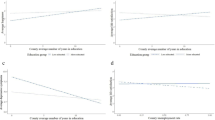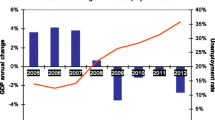Abstract
Objective
The aim of this study was to investigate whether family income and education have a causal effect on psychological distress among Canadian adults.
Methods
We executed fixed-effects regression analyses using data from the Longitudinal and International Study of Adults (LISA). We investigated whether changes in family income and education from wave 2 (2014) to wave 3 (2016) corresponded with changes in psychological distress during this same time period. We also investigated whether changes in these socio-economic resources from wave 1 (2012) to wave 2 (2014) corresponded with lagged changes in psychological distress from wave 2 (2014) to wave 3 (2016). These models controlled for all time-invariant confounders with time-invariant effects, as well as the time-varying factors age, marital status, household size, and employment status.
Results
Obtaining a postsecondary degree corresponded with lagged decreases in psychological distress among women ages 18 to 32 (b = −1.97; 95% CI = −3.53, −0.42) and men over the age of 32 (b = −1.86; 95% CI = −3.57, −0.15). The effect of postsecondary education was stronger when considering adults who stayed married throughout the three waves (b = −2.29; 95% CI = −4.37, −0.21).
Conclusion
Completing postsecondary education may have a lagged causal effect on psychological distress, and the life course timing for when postsecondary completion reduces distress is different for women and men.
Résumé
Objectif
L’objectif de cette étude était de déterminer si le revenu familial et le niveau de scolarité ont un effet causal sur la détresse psychologique chez les adultes canadiens.
Méthodes
Nous avons exécuté des analyses de régression à effets fixes en utilisant les données de l’Étude longitudinale et internationale des adultes (ELIA). Nous cherchions à savoir si les changements dans le revenu familial et le niveau de scolarité de la deuxième vague (2014) à la troisième vague (2016) correspondaient à des changements dans la détresse psychologique au cours de cette même période. Nous cherchions également à savoir si les changements dans ces ressources socio-économiques de la première vague (2012) à la deuxième vague (2014) correspondaient à un futur changement de la détresse psychologique de la deuxième vague (2014) à la troisième vague (2016). Ces modèles contrôlaient tous les facteurs de confusion invariant dans le temps, ainsi que quelques facteurs variant dans le temps (l’âge, l’état matrimonial, la taille du ménage et la situation d’emploi).
Résultats
L’obtention d’un diplôme d’études postsecondaires correspondait à des diminutions futures de la détresse psychologique chez les femmes de 18 à 32 ans (b = −1,97; IC à 95% = −3,53, −0,42) et les hommes de plus de 32 ans (b = −1,86; IC à 95% = −3,57, −0,15). L’effet des études postsecondaires était plus grand chez les adultes qui sont restés mariés pendant les trois vagues (b = −2,29; IC à 95% = −4,37, − 0,21).
Conclusion
L’accomplissement des études postsecondaires peut avoir un effet causal sur la détresse psychologique. On note aussi que la période de vie pendant laquelle cette réduction est observée est différente pour les hommes et les femmes.
Similar content being viewed by others
Availability of data and materials
Data cannot be shared publicly because of Statistics Canada’s confidentiality policies when using survey data linked to Canada Revenue Agency income data. Data are available from the Research Data Centres in 32 universities across Canada for researchers who meet the criteria for access to confidential data (https://www.statcan.gc.ca/eng/microdata/data-centres). The analyses for this study were conducted in the Research Data Centre at UBC-Vancouver.
Code availability
Syntax files require vetting by RDC staff.
Change history
19 June 2021
This article was updated to correct an entry in Table 1: minus sign inserted to read “-0.42” in the “Postsecondary degree” line of the “Lagged (2012–2014)” section.
07 July 2021
A Correction to this paper has been published: https://doi.org/10.17269/s41997-021-00555-y
Notes
The T1 Family File contains income data for Census families. A Census family is comprised of a married couple with or without children of either or both spouses, a common-law couple with or without children of either or both partners, a lone parent living with at least one child, or a person living alone. Economic families and households can contain more than one Census family.
References
Allison, P. D. (2009). Fixed effects regression models. SAGE Publications.
Andrews, G., & Slade, T. (2001). Interpreting scores on the Kessler Psychological Distress Scale (K10). Australian and New Zealand Journal of Public Health, 25(6), 494–497. https://doi.org/10.1111/j.1467-842X.2001.tb00310.x.
Apouey, B., & Clark, A. E. (2015). Winning big but feeling no better? The effect of lottery prizes on physical and mental health. Health Economics, 24(5), 516–538. https://doi.org/10.1002/hec.3035.
Baxter, J., Hewitt, B., & Haynes, M. (2008). Life course transitions and housework: Marriage, parenthood, and time on housework. Journal of Marriage and Family, 70(2), 259–272. https://doi.org/10.1111/j.1741-3737.2008.00479.x.
Bergman, P., Ahlberg, G., Forsell, Y., & Lundberg, I. (2010). Non-participation in the second wave of the part study on mental disorder and its effects on risk estimates. International Journal of Social Psychiatry, 56(2), 119–132. https://doi.org/10.1177/0020764008098838.
Berry, B. (2007). Does money buy better health? Unpacking the income to health association after midlife. Health: An Interdisciplinary Journal for the Social Study of Health, Illness and Medicine, 11(2), 199–226. https://doi.org/10.1177/1363459307074694.
Bourdieu, P., & Passeron, J. (1990). Reproduction in education, society and culture (Second ed.). SAGE Publications.
Chevalier, A., & Feinstein, L. (2006). Sheepskin or Prozac: The causal effect of education on mental health. IZA Discussion Paper No. 2231.
Chin, B. (2010). Income, health, and well-being in rural Malawi. Demographic Research, 23, 997–1030. Retrieved from http://www.jstor.org/stable/26349620.
Dahmann, S. C., & Schnitzlein, D. D. (2019). No evidence for a protective effect of education on mental health. Social Science & Medicine, 241, 112584. https://doi.org/10.1016/j.socscimed.2019.112584.
Dalgard, O. S., Mykletun, A., Rognerud, M., Johansen, R., & Zahl, P. H. (2007). Education, sense of mastery and mental health: Results from a nation wide health monitoring study in Norway. BMC Psychiatry, 7(1), 20. https://doi.org/10.1186/1471-244X-7-20.
Frijters, P., Haisken-DeNew, J. P., & Shields, M. A. (2005). The causal effect of income on health: Evidence from German reunification. Journal of Health Economics, 24(5), 997–1017. https://doi.org/10.1016/j.jhealeco.2005.01.004.
Gardner, J., & Oswald, A. J. (2007). Money and mental wellbeing: A longitudinal study of medium-sized lottery wins. Journal of Health Economics, 26(1), 49–60. https://doi.org/10.1016/j.jhealeco.2006.08.004.
Glymour, M. M., Avendano, M., & Kawachi, I. (2014). Socioeconomic status and health. In L. Berkman, I. Kawachi, & M. M. Glymour (Eds.), Social Epidemiology (2nd ed.). https://doi.org/10.1093/med/9780195377903.001.0001.
Haapea, M., Miettunen, J., Veijola, J., Lauronen, E., Tanskanen, P., & Isohanni, M. (2007). Non-participation may bias the results of a psychiatric survey. Social Psychiatry and Psychiatric Epidemiology, 42(5), 403–409. https://doi.org/10.1007/s00127-007-0178-z.
Halpern-Manners, A., Schnabel, L., Hernandez, E. M., Silberg, J. L., & Eaves, L. J. (2016). The relationship between education and mental health: New evidence from a discordant twin study. Social Forces, 95(1), 107–131. Retrieved from http://www.jstor.org/stable/24754267.
Hay, D. I. (1988). Socioeconomic status and health status: A study of males in the Canada health survey. Social Science and Medicine, 27(12), 1317–1325. https://doi.org/10.1016/0277-9536(88)90196-7.
Imlach Gunasekara, F., Carter, K., & Blakely, T. (2011). Change in income and change in self-rated health: Systematic review of studies using repeated measures to control for confounding bias. Social Science & Medicine, 72(2), 193–201. https://doi.org/10.1016/j.socscimed.2010.10.029.
Kendall, G. E., Nguyen, H., & Ong, R. (2019). The association between income, wealth, economic security perception, and health: A longitudinal Australian study. Health Sociology Review, 28(1), 20–38. https://doi.org/10.1080/14461242.2018.1530574.
Kessler, R. C. (1982). A disaggregation of the relationship between socioeconomic status and psychological distress. American Sociological Review, 47(6), 752–764. https://doi.org/10.2307/2095211.
Kessler, R. C., Barker, P. R., Colpe, L. J., Epstein, J. F., Gfroerer, J. C., Hiripi, E., et al. (2003). Screening for serious mental illness in the general population. Archives of General Psychiatry, 60(2), 184–189. https://doi.org/10.1001/archpsyc.60.2.184.
Koltai, J., Bierman, A., & Schieman, S. (2018). Financial circumstances, mastery, and mental health: Taking unobserved time-stable influences into account. Social Science & Medicine, 202, 108–116. https://doi.org/10.1016/j.socscimed.2018.01.019.
Litwin, H., & Sapir, E. V. (2009). Perceived income adequacy among older adults in 12 countries: Findings from the survey of health, ageing, and retirement in Europe. The Gerontologist, 49(3), 397–406. https://doi.org/10.1093/geront/gnp036.
Mrig, E. H. (2020). Integrating fundamental cause theory and Bourdieu to explain pathways between socioeconomic status and health: The case of health insurance denials for genetic testing. Sociology of Health & Illness, 0(0), 1–16. https://doi.org/10.1111/1467-9566.13195.
Nieminen, T., Prättälä, R., Martelin, T., Härkänen, T., Hyyppä, M. T., Alanen, E., & Koskinen, S. (2013). Social capital, health behaviours and health: A population-based associational study. BMC Public Health, 13(1), 613. https://doi.org/10.1186/1471-2458-13-613.
Ross, C. E., & Mirowsky, J. (2011). The interaction of personal and parental education on health. Social Science & Medicine, 72(4), 591–599. https://doi.org/10.1016/j.socscimed.2010.11.028.
Statistics Canada. (2016). Longitudinal and International Study of Adults (LISA). Retrieved from https://www23.statcan.gc.ca/imdb/p2SV.pl?Function=getSurvey&Id=148150.
Statistics Canada. (2017). Postsecondary graduates, by location of residence at interview and level of study. Retrieved from https://www150.statcan.gc.ca/t1/tbl1/en/tv.action?pid=3710003101.
Stephens, T., Dulberg, C., & Joubert, N. (1999). Mental health of the Canadian population: A comprehensive analysis. Chronic Diseases in Canada, 20(3), 118–126.
Vaisey, S., & Miles, A. (2017). What you can—and can’t—do with three-wave panel data. Sociological Methods & Research, 46(1), 44–67. https://doi.org/10.1177/0049124114547769.
Varin, M., Palladino, E., Lary, T., & Baker, M. (2020). At-a-glance – An update on positive mental health among adults in Canada. Health Promotion and Chronic Disease Prevention in Canada: Research, Policy and Practice, 40(3), 86–91.
Veenstra, G. (2007). Social space, social class and Bourdieu: Health inequalities in British Columbia, Canada. Health and Place, 13(1), 14–31. https://doi.org/10.1016/j.healthplace.2005.09.011.
Veenstra, G. (2017). Infusing fundamental cause theory with features of Pierre Bourdieu’s theory of symbolic power. Scandinavian Journal of Public Health, 46(1), 49–52. https://doi.org/10.1177/1403494817748253.
Veenstra, G., & Vanzella-Yang, A. (2020a). Does household income mediate the association between education and health in Canada? Scandinavian Journal of Public Health, 1403494820917534.
Veenstra, G., & Vanzella-Yang, A. (2020b). Family income and self-rated health in Canada: Using fixed effects models to control for unobserved confounders and investigate causal temporality. Social Science and Medicine, 250(February), 112884. https://doi.org/10.1016/j.socscimed.2020.112884.
Wang, J. L., Schmitz, N., & Dewa, C. S. (2010). Socioeconomic status and the risk of major depression: The Canadian National Population Health Survey. Journal of Epidemiology and Community Health, 64(5), 447 LP–447452. https://doi.org/10.1136/jech.2009.090910.
Zimmerman, F. J., & Katon, W. (2005). Socioeconomic status, depression disparities, and financial strain: What lies behind the income-depression relationship? Health Economics, 14(12), 1197–1215. https://doi.org/10.1002/hec.1011.
Funding
This research was supported by an Insight Grant awarded to GV (grant number 435-2019-0003) and a Joseph-Armand Bombardier Canada Graduate Scholarship awarded to AVY (grant number 767-2019-2938) by the Social Sciences and Humanities Research Council of Canada.
Author information
Authors and Affiliations
Contributions
AVY and GV: conceptualization, methodology, formal analysis, data curation. AVY: writing of original draft; funding acquisition. GV: review and editing; funding acquisition.
Corresponding author
Ethics declarations
Ethics approval
The study was approved by the Behavioural Research Board at the University of British Columbia (H18-02461). Clearance to access the raw data was granted by Statistics Canada.
Consent to participate
Not applicable.
Consent for publication
Not applicable.
Conflict of interest
The authors declare no competing interests.
Disclaimer
The funders had no role in the design of the study, in the collection, analysis, and interpretation of the data, and in the writing of the manuscript.
Additional information
Publisher’s note
Springer Nature remains neutral with regard to jurisdictional claims in published maps and institutional affiliations.
Rights and permissions
About this article
Cite this article
Vanzella-Yang, A., Veenstra, G. Socio-economic resources and adult mental health in Canada: controlling for time-invariant confounders and investigating causal directionality. Can J Public Health 112, 1042–1049 (2021). https://doi.org/10.17269/s41997-021-00547-y
Received:
Accepted:
Published:
Issue Date:
DOI: https://doi.org/10.17269/s41997-021-00547-y




